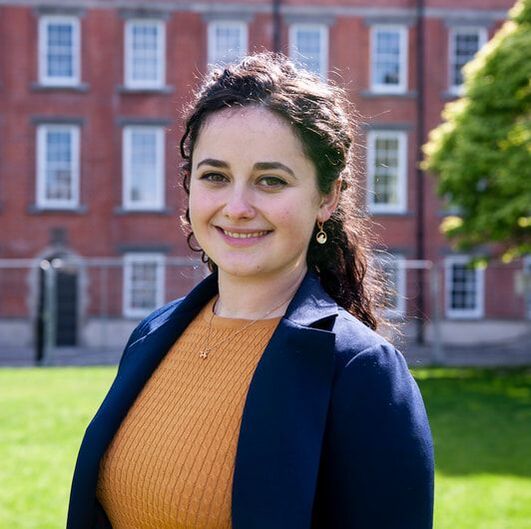aNETA NERGUTIMSc in Global Challenges for Sustainability
Bachelors (Hons) Environmental Science |
Aneta joined Carrig in 2019, as part of Carrig Research. Her work focusses on climate change and heritage, life cycle assessments and dissemination of Carrig projects on social media.
Graduating from Trinity College Dublin with a first-class honours degree in Environmental Science in 2019, Aneta then went on to complete a Masters in Global Challenges for Sustainability in 2023, also at TCD. She has a CPD cert in Geographical Information Systems (GIS) from Technological University Dublin. Aneta also has experience in sound editing and producing, as she was one of the core team who established Trinity Talks Science, Trinity College’s first general science podcast. Projects include: Project - Energy Efficiency Guidance of Traditional Buildings Client - The Department of Culture, Heritage and the Gaeltacht Description - The Irish Government announced plans to refurbish 500,000 homes to a Building Energy Rating of B2 as part of the European Renovation Wave. Carrig is part of the team working on the government guidance on achieving this goal. Research work includes compiling best practice guidance on how to energy upgrade older building while minimising the embodied carbon emissions of the upgrade, illustrated with worked case studies. Final report to be published in 2021 Project - Climate Change Risk Assessment of Skellig Michael, UNESCO World Heritage Site Client – Office of Public Works Description - Skellig Michael is one of two World Heritage Sites in Ireland and is popular nationally and internationally but faces issues due to climate change such as increased rain fall, sea level rise and wind storms. Research includes determining the predicted changes in climate for Skellig Michael in the next 50 years based on existing research and predicting how this will affect the site, its tourism, heritage and wildlife. The risk assessment is composed of applying the Adapt Northern Heritage risk assessment matrix in combination with the Climate Vulnerability Index by James Cooke University to Skellig Michael. Assessment of risks, vulnerabilities and adaptation options will be based on several workshops with stakeholders such as heritage professionals, local workers, tourism professionals, wildlife specialists and engineers. Full assessment ongoing throughout 2021 Project - Regeneration of Galway Towns - Loughrea, Portumna, Athenry and Ballinasloe Client – Galway County Council Description - Research report of the potential regeneration options for Galway town centers. Map work involves sourcing and working with shapefiles to show the town centers and relevant features such as Architectural Conservation Areas and projected Flood Zones. Project - Fundamentals of Energy Renovation for Traditional Buildings (Continuing Professional Development Course) Client – Heritage Council Description - Lecture series developed with the Heritage Council to upskill architects, engineers, policymakers, contractors and building craftspeople in the sustainable retrofit of traditional buildings; best practice, respecting integrity of traditional buildings, reducing environmental impact of projects, using renewable forms of energy etc. Worked closely with the attendees and stakeholders to design the modules and speaker list of experts from the UK and Ireland. Course content was moderated online and feedback was collated on a regular basis to improve aspects of the lecture series. Project – Understanding Carbon in the Historic Environment Client – Historic England Description – In 2019, Carrig and Prof Aidan Duffy from Technological University Dublin (TUD) were commissioned to carry out Life Cycle Assessment (LCA) study. The construction industry is responsible for a large amount of carbon emissions, but no meaningful data is available on how much of this carbon is due to new buildings and how much is due to older buildings. This project focused on the comparison of the carbon emissions of a refurbished older building with the carbon emissions of a new building to indicate which option may be better in terms of reducing carbon emissions from the industry. This study included the analysis of 5 retrofit case study buildings spanning traditional and modern construction and revealed that the level of intervention and type of materials used during the retrofit had a decisive impact on the carbon emissions associated with each project. However, it showed that the retrofit of existing buildings is almost always the lower carbon solution. This scoping study also provided key information on what would be required of a suitable LCA tool to enable building professionals to make more sustainable, lower carbon specification choices in both new construction and retrofit projects. |
|
T. +353 (0)1 552 9080
E. [email protected] |
VAT IE8240008C
Company Reg. 240008 Directors Peter Cox | Aileen Le Brocquy |

